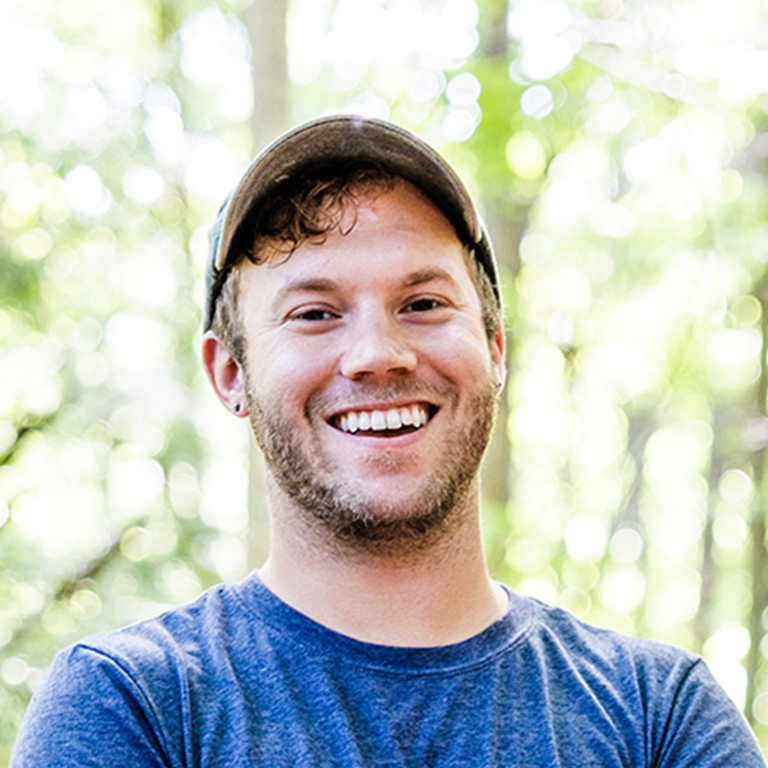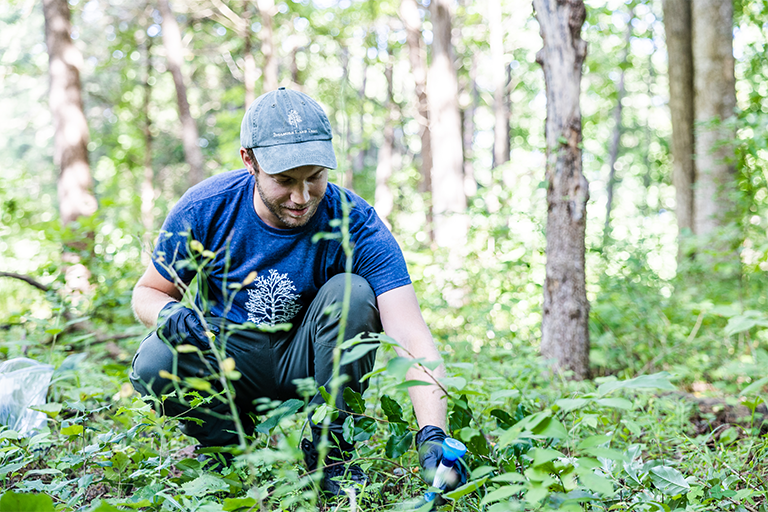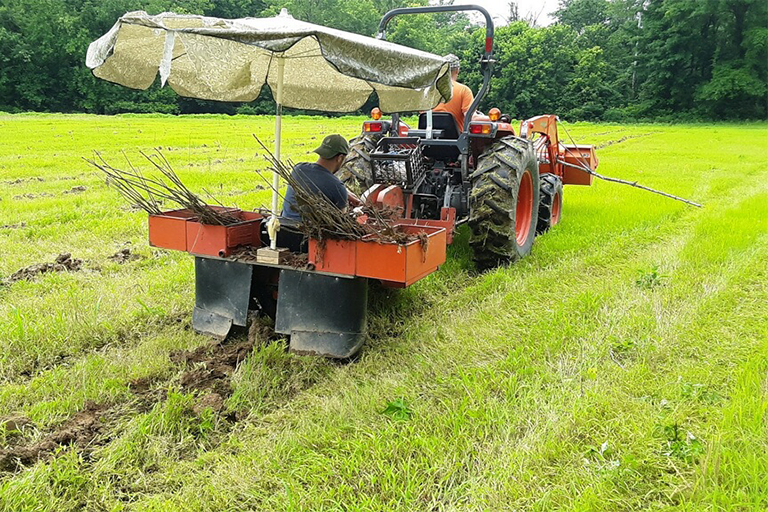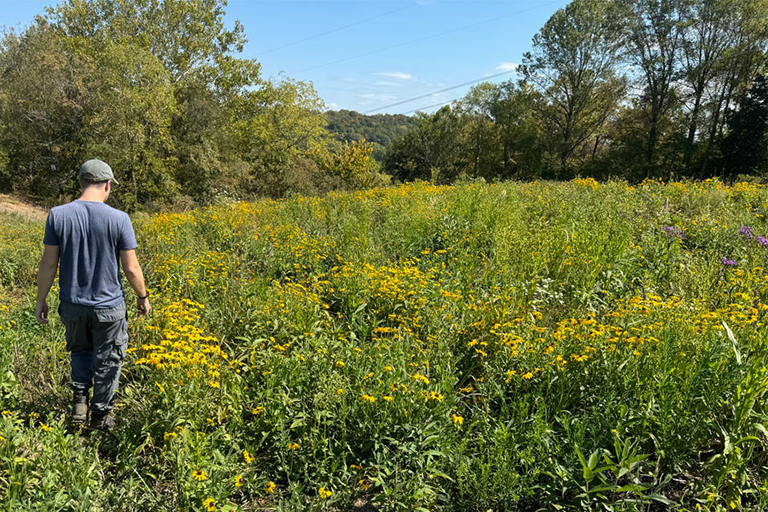This Q&A series highlights McKinney Climate Fellows alumni and their professional journeys within Indiana and beyond. The McKinney Climate Fellows program, administered by Indiana University’s Environmental Resilience Institute with support from the Integrated Program in the Environment, connects IU undergraduate and graduate students interested in climate, sustainability, and community resilience with career experiences.
As a graduate student interested in environmental science and ecology, Ben Sebastian oftentimes felt overwhelmed navigating the conservation community. A McKinney Climate Fellowship with Sycamore Land Trust in 2022 provided the confidence boost he needed to pursue a career in environmental conservation.
Two years after graduating from the O’Neill School of Public and Environmental Affairs with a dual master's degree in environmental science and public affairs, Sebastian accepted a full-time role with Sycamore Land Trust, where he helps manage around 12,000 acres in Indiana.
The following interview has been lightly edited for length and clarity.
What was your McKinney Climate Fellow placement and what were some of the major projects you worked on?
My placement was with Sycamore Land Trust during the summer of 2022 and then I extended through the fall.
A lot of my projects were focused on wetland construction at the Fix-Stoelting Preserve and the Shine Preserve. At these two overarching projects, there was a lot of tree planting, invasive species management, and surveying. We also focused on protecting species like the Kirtland’s snake, an endangered snake in Indiana found in the Bean Blossom Creek watershed.
What are some key skills you learned during your fellowship?
There’s a lot that goes into active land management that you can’t learn in a classroom, especially hands-on skills. Being part of the McKinney program with Sycamore, I was able to get boots-on-the-ground experience. It gave me perspective into why I was interested in what I was learning in school and how to apply those concepts in an ecology setting.
How did the McKinney Climate Fellowship inform your career path and how did you get to your current role?
When McKinney paired me with Sycamore, which was a fieldwork-focused position, it reinvigorated my interest in what I was interested in with grad school. It reminded me of why I chose this career in the first place and my interest in field-based research.
When I graduated in 2022, Sycamore hired me as a part-time land stewardship assistant, where I stayed until the spring of 2023. I was able to network with other conservation organizations and landed a full-time technician position with Eco Logic for the 2023 field season. In 2024, I went back to Sycamore to further work as an assistant while also working with Oiko, another local habitat restoration organization. I was beginning a second field season with Eco Logic when a full-time land steward position opened up with Sycamore Land Trust. I was able to secure this position and am now a permanent full-time land steward.
What responsibilities do you have in your current role and what do you enjoy about it?
Sycamore Land Trust owns and protects over 12,000 acres across Indiana in the form of both public and non-public nature preserves. The stewardship department is in charge of managing these areas with a general goal of improving native biodiversity through habitat restoration.
In this position, I enjoy the consistent opportunity to learn something new as I navigate the complex facets that could affect the ecology of an area. From hydrology, to forestry, to animal behavior, there is always another factor to think critically about when making environmental management decisions.
What excited me most about this position is that Sycamore has a unique potential for environmental science since these preserves are legally protected from development forever. This allows us to perform ecological research at these preserves, and we maintain control over the monitoring and progression of this research. Considering long-term monitoring is a known gap in ecological research, the projects we implement on these preserves could have a substantial and lasting impact on how we manage similar land types in the future.
What skills did you gain from your McKinney Climate Fellowship that help you in your land steward role now?
Starting graduate school during the height of the Covid-19 pandemic proved discouraging given my intentions for my education. With an undergraduate degree in general biology, I intended for my graduate school experience to be heavy in fieldwork courses. This proved difficult as many courses, even field labs, switched to a more remote format. Also, the already limited opportunities to gain experience with environmental organizations became virtually non-existent as many internship programs were stalled during this time.
The McKinney Climate Fellowship reinvigorated my confidence to choose to pursue graduate school by pairing me with the perfect internship to complement my ecology studies. Not only that, but the fellowship facilitated an extensive community that continues to provide guidance and resources as I navigate my budding career as an ecologist.
What called you to pursue a career in the environmental field?
I had a four-year gap after obtaining my undergraduate degree in biology where I experimented with positions in medical and biotechnology fields. My curiosity felt limited in these settings, and eventually I found that ecology had a more enticing career path. I can now use my skillset in biological science to think critically about the ever-changing environmental problems that threaten the health of our planet.
What advice do you have for someone interested in the environmental field?
This field can be intimidating simply based on the complexity and extensiveness of the problems that arise. Don't sell yourself short on your capability to help solve these problems.
We need all types of people with diverse experiences and skillsets to make sure we are addressing these ecological problems with the most comprehensive analysis of potential solutions.
Also, challenge yourself to develop a patchwork of expertise, even if it seems outside the realm of your interests. This will give you a foundation for contributing to a wide range of project types and allow you to more easily pivot career paths. And who knows, you may spark a passion that you didn't know was there if you never gave yourself the chance to try something different or uncomfortable.
About the Environmental Resilience Institute
Indiana University’s Environmental Resilience Institute connects a broad coalition of government, business, nonprofit, and community leaders to help Indiana and the Midwest better prepare for the challenges of environmental change. Together, we integrate research, education, and community to create environmental resilience and climate solutions—building a more sustainable, equitable, and prosperous future. Learn more at eri.iu.edu.
About the Integrated Program in the Environment
Bringing together faculty, students and staff across 10 Indiana University schools, the Integrated Program in the Environment is a hub for academics, research, and activities focused on the environment. Administered by the O’Neill School of Public and Environmental Affairs, the School of Public Health, and College of Arts and Sciences, IPE is preparing the next generation of environmental and sustainability leaders. Learn more at environment.indiana.edu.






